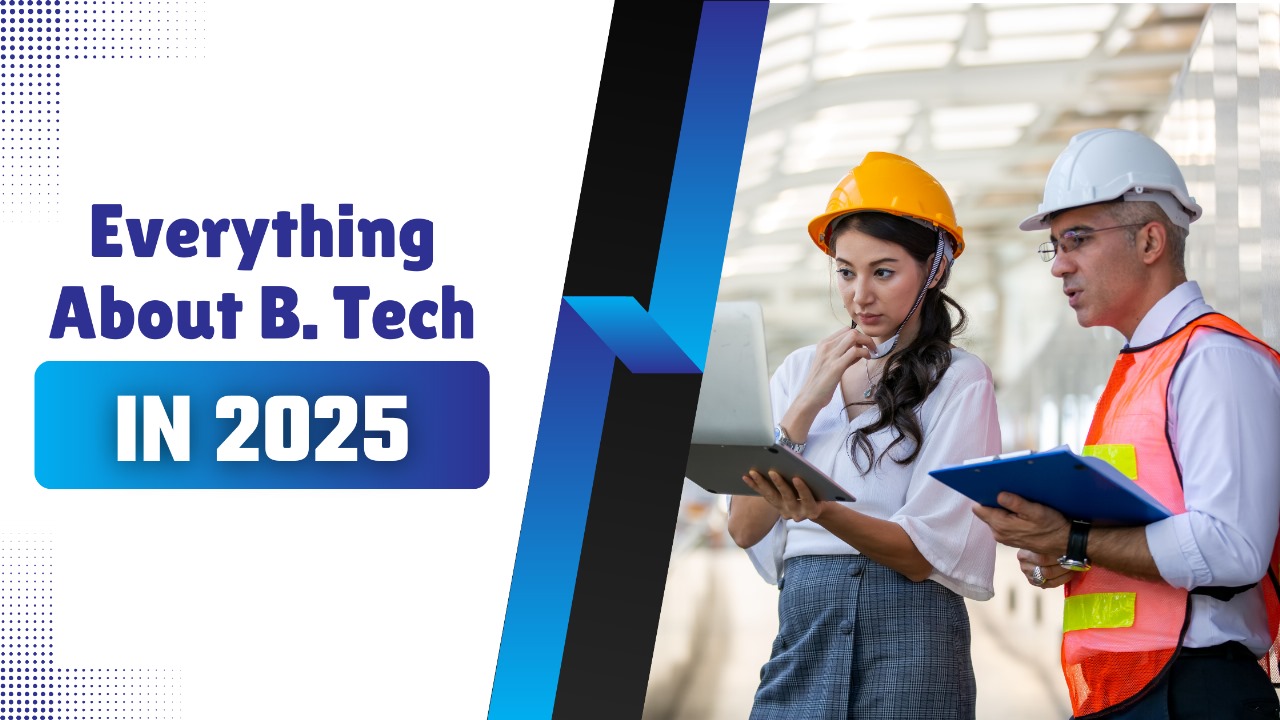
Categories
Ultimate Guide to B.Tech Program in India – Courses, Specializations & Career Scope with Learnerhunt
JEE Main, JEE Advanced, Entrance Exam, B.Tech | 06-06-2025

Introduction
If you're a student standing at the threshold of your academic journey, wondering where to go after class 12th with PCM (Physics, Chemistry, Mathematics), then a B.Tech (Bachelor of Technology) could be your golden ticket. This course doesn’t just teach you technical skills; it prepares you for a future of innovation and endless career opportunities. With new technologies emerging and reshaping industries, engineering has become a dynamic field with a variety of exciting specializations.
In this guide, we’ll break down everything about the B.Tech program, from specializations and top colleges to career prospects and how Learnerhunt, your trusted admission counselor, can help you get into the right engineering college.
Overview of B.Tech in India
The B.Tech degree is a four-year undergraduate course divided into eight semesters. It's designed for students with a science background, particularly those who studied PCM in their 10+2 education. The core focus is on building analytical, design, and problem-solving skills in a chosen engineering domain.
Eligibility for B.Tech generally requires a minimum of 50% marks in class 12th with PCM, although some reputed institutions demand higher percentages or entrance exam rankings.
Admission to B.Tech programs is typically done through national-level entrance exams like JEE Main and JEE Advanced, or state-level tests like MHT-CET, WBJEE, and others. Private universities also conduct their own exams or accept direct admissions.
Top Entrance Exams for B.Tech
Among the most recognized exams in India for B.Tech admissions are JEE Main and JEE Advanced, which lead to prestigious institutions like the IITs and NITs. Others include:
BITSAT (Birla Institute of Technology and Science)
VITEEE (Vellore Institute of Technology)
SRMJEEE (SRM University)
COMEDK (Consortium of Medical, Engineering and Dental Colleges of Karnataka)
UPSEE (Uttar Pradesh State Entrance Examination)
Popular B.Tech Specializations
India's technology sector is vast, and so are the opportunities in B.Tech. Let’s explore the most in-demand branches and what they offer.
Computer Science Engineering (CSE)
Computer Science is widely regarded as the most in-demand and sought-after branch in engineering today. It includes subjects like programming, algorithms, data structures, artificial intelligence, machine learning, and web development. Graduates find careers as software developers, app developers, AI engineers, system architects, and data scientists in both startups and multinational companies.
Mechanical Engineering
Mechanical engineering is one of the oldest disciplines. It focuses on mechanics, thermodynamics, design, and manufacturing processes. Career opportunities include roles in automotive companies, manufacturing firms, R&D labs, and the public sector.
Civil Engineering
Civil engineers shape our cities — from roads and bridges to skyscrapers and dams. It’s an ideal specialization for those interested in infrastructure development. Popular job profiles include site engineer, structural designer, and urban planner.
Electrical Engineering
This branch covers electricity, electronics, control systems, and electromagnetism.It plays a crucial role in power generation, transmission, and automation industries. Students may work in companies like NTPC, Power Grid, or in the electrical division of any MNC.
Electronics and Communication Engineering (ECE)
ECE merges the study of electronics with communication technologies like mobile phones, satellite systems, and IoT. Graduates are hired in roles like network engineer, embedded system designer, and communication specialist.
Information Technology (IT)
IT engineering focuses on software applications, networks, databases, and cybersecurity. It’s closely related to CSE but leans more toward managing technology infrastructure. You’ll find IT graduates in system admin, support, cloud services, and cybersecurity roles.
Artificial Intelligence and Machine Learning
AI & ML are revolutionizing industries. This specialization introduces algorithms that allow machines to learn and make decisions. Career opportunities include AI engineer, data analyst, robotics scientist, and deep learning specialist.
Data Science and Big Data Analytics
If data is the new oil, then data scientists are the engineers who refine and unlock its true value. This branch deals with extracting valuable insights from massive datasets. You’ll learn Python, R, statistics, and visualization tools like Tableau and PowerBI.
Aerospace Engineering
Aerospace engineering is dedicated to the design, development, and testing of aircraft and spacecraft. Graduates in this field can pursue exciting careers with aviation companies, space research organizations like ISRO and NASA, or defense and aerospace sectors.
Chemical Engineering
This branch combines chemistry, physics, and mathematics to solve problems in manufacturing, environmental safety, and energy production. Chemical engineers often work in pharmaceuticals, petroleum, and FMCG industries.
Biotechnology Engineering
Biotech is the perfect blend of biology and technology. This field is booming with advancements in healthcare, agriculture, and pharmaceuticals. Career paths include genetic engineering, clinical research, and drug development.
Robotics and Automation
This cutting-edge field equips you with the skills to design robots and automated systems by integrating artificial intelligence with mechanical engineering. It plays a vital role in industries like manufacturing, logistics, and healthcare.
B.Tech vs BE – What’s the Difference?
Though both degrees are practically the same in India, B.Tech is generally considered more hands-on and application-oriented, whereas BE (Bachelor of Engineering) tends to be more theoretical. Employers treat both degrees equally, and your college and specialization will matter more than the title of the degree.
Skills You Gain from a B.Tech Program
B.Tech doesn't just teach technical knowledge — it molds you into a problem solver. Along with core engineering skills, students develop leadership, teamwork, communication, time management, and decision-making abilities. You also learn project development, coding (in tech branches), and industry-based tools and software.
Career Options After B.Tech
After graduating, you’ll find opportunities across various domains.
Private Sector Jobs
The private sector offers abundant opportunities, ranging from IT giants like TCS, Infosys, Wipro, and Google to core engineering companies such as Larsen & Toubro, Tata Motors, and Siemens. Campus placements and internships frequently pave the way to full-time employment.
Government Jobs
Public Sector Undertakings (PSUs) like BHEL, ONGC, DRDO, and Indian Railways recruit B.Tech grads through GATE or direct exams. Civil Services, Defense, and other sectors are also options.
Higher Studies
If you wish to specialize, you can go for M.Tech, MS, or even PhD. MBA is another great route for those interested in management. Many students also pursue masters abroad or certifications in niche areas.
Top B.Tech Colleges in India
Here’s a quick list of some of the most sought-after colleges for B.Tech:
Indian Institutes of Technology (IITs)
National Institutes of Technology (NITs)
IIITs (Indian Institute of Information Technology)
BITS Pilani
VIT Vellore
SRM Institute of Science and Technology
Manipal Institute of Technology
Delhi Technological University (DTU)
How Learnerhunt Helps You Get Admission in Top B.Tech Colleges
Choosing the right engineering college and specialization is a life-changing decision.That’s where Learnerhunt comes in as your reliable and trusted partner for college admissions. Whether you're targeting government institutes, private universities, or looking for direct admissions, Learnerhunt offers end-to-end guidance.
Our expert counselors will help you choose the best-fit colleges based on your scores, interests, and career goals. From filling out application forms to arranging documents, scholarships, and college visits, Learnerhunt takes care of it all.
If you're confused about entrance exams, don't worry — we help you prepare and track the important dates too. With personalized attention and years of expertise, Learnerhunt ensures your transition from student to future engineer is smooth and stress-free.
Call us today at +91-8860077807 or visit learnerhunt.co to book your free counseling session!
Conclusion
A B.Tech degree is not just a course — it's a gateway to building, innovating, and transforming the world. Whether you're coding the next big app, designing skyscrapers, or launching rockets, B.Tech offers a platform to dream big and achieve bigger.
The opportunities are endless — and with multiple specializations available, you can find your niche easily. Just make sure you take expert advice and guidance from a reliable source like Learnerhunt, who can help you unlock the best college and career suited to your ambitions.
Read Blog: How to Choose the Right MBA Courses in France for Your Goals
FAQs
Q1: What is the best B.Tech branch for future scope?
Currently, Computer Science, Artificial Intelligence, and Data Science are leading the charts in terms of career growth and salary.
Q2: Can I get into B.Tech without JEE?
Yes, many private universities and colleges offer direct admission based on your 12th marks or their own entrance tests.
Q3: Is a diploma holder eligible for B.Tech?
Yes, diploma holders can pursue B.Tech programs through lateral entry, which allows direct admission into the second year of the course.
Q4: Does Learnerhunt charge for counseling?
No, Learnerhunt offers free expert counseling to help students choose the right B.Tech college and specialization.
Q5: What documents are required for B.Tech admission?
Common documents include 10th & 12th mark sheets, ID proof, transfer certificate, entrance exam scorecard (if applicable), and photographs.











